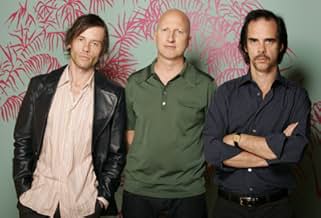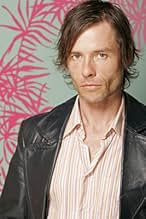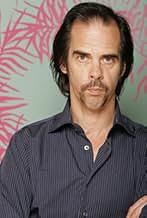A lawman apprehends a notorious outlaw and gives him nine days to kill his older brother, or else they'll execute his younger brother.A lawman apprehends a notorious outlaw and gives him nine days to kill his older brother, or else they'll execute his younger brother.A lawman apprehends a notorious outlaw and gives him nine days to kill his older brother, or else they'll execute his younger brother.
- Awards
- 14 wins & 30 nominations
- Director
- Writer
- All cast & crew
- Production, box office & more at IMDbPro
Storyline
Did you know
- TriviaIn a 2018 interview, Guy Pearce said that this is his favorite of all of the movies he's ever done.
- GoofsAlthough the story takes place in the 1880s, Jellon sings "Danny Boy" - which wasn't published until 1913.
- Quotes
Arthur Burns: Love. Love is the key. Love and family. For what are night and day, the sun, the moon, the stars without love, and those you love around you? What could be more hollow than to die alone, unloved?
- Crazy creditsThe opening credits are shown first against a background of period photographs of Australia, which after a time become photographs of the actors/characters, locations and scenes in the film. The end credits are similarly displayed, but only period photographs are used. This is of special note in view of the noted disclaimer, since some indigenous aboriginal groups can be offended by such images.
- SoundtracksThere Is a Happy Land
(1850)
Traditional
Music by Leonard P. Breedlove (uncredited) (1850)
Words by Andrew Young (1838)
Arranged by Nick Cave and Warren Ellis
Featured review
Following the rape and murder of a colonial family, outlaw brothers Charlie and Mikey burns are captured by ruthless local lawman, Captain Stanley. Rather than imprison both fugitives, Stanley presents Charlie with a proposition (though it's really a demand) that Charlie kill his older brother, and gang leader, Arthur or else Mikey will meet his demise at the end of a hangman's noose. It is a proposition which will have karmic repercussions for all involved.
Directed by Brisbanite John Hillcoate from a script by Aussie indie icon Nick Cave, this film has some of the most gorgeous photography of the Australian outback ever committed to film, showcasing it's unique desolate beauty in it's dust, flies and exquisite sunsets.
Hillcoate assembles a very fine ensemble cast, most notably Ray Winstone as Captain Stanley and Guy Pearce as Charlie Burns - two actors performing at the top of their game. Danny Huston is effective as Arthur Burns, a man whose serene exterior belies his vicious temperament. Other performers include Emily Watson and John Hurt, as well as fine Australian talent David Wenham, Leah Purcell, Tommy Lewis and quintessential movie aborigine David Gulpilil. All performances are excellent.
Despite it's high violence quotient, the film has an admirable lack of moralistic tone. There are no obvious good guys and bad guys, all the characters are shades of grey possessing both positive and negative attributes, although some characters may lean one way or the other. In particular, Captain Stanley has a good heart though history may judge his methods of justice with contempt, and Charlie Burns has a fierce sense of loyalty and honour but his associated family ties have led him to commit horrific crimes. Even Captain Stanley's wife, Martha, in all her Victorian innocence and naivety, has a dark side to her soul; an attribute which will further propel all towards their destinies.
It's strong subtext of white colonialists' condescending treatment of the aboriginal population puts this film in fine company with other Australian indigenous-themed films such as Fred Schepisi's The Chant Of Jimmy Blacksmith, Nicholas Roeg's Walkabout, Rolf de Heer's The Tracker and Phillip Noyce's Rabbit Proof Fence. The Proposition is the best of these. This is a big call, I know, but the fact is that none of those other very fine Australian films possess the tension which so completely permeates Hillcoates' picture. This film represents a major achievement for both Hillcoate and Cave and is the best Australian film to leave these shores since Ray Lawrence's Lantana.
8.5 out of 10.
Slick. :cool:
Directed by Brisbanite John Hillcoate from a script by Aussie indie icon Nick Cave, this film has some of the most gorgeous photography of the Australian outback ever committed to film, showcasing it's unique desolate beauty in it's dust, flies and exquisite sunsets.
Hillcoate assembles a very fine ensemble cast, most notably Ray Winstone as Captain Stanley and Guy Pearce as Charlie Burns - two actors performing at the top of their game. Danny Huston is effective as Arthur Burns, a man whose serene exterior belies his vicious temperament. Other performers include Emily Watson and John Hurt, as well as fine Australian talent David Wenham, Leah Purcell, Tommy Lewis and quintessential movie aborigine David Gulpilil. All performances are excellent.
Despite it's high violence quotient, the film has an admirable lack of moralistic tone. There are no obvious good guys and bad guys, all the characters are shades of grey possessing both positive and negative attributes, although some characters may lean one way or the other. In particular, Captain Stanley has a good heart though history may judge his methods of justice with contempt, and Charlie Burns has a fierce sense of loyalty and honour but his associated family ties have led him to commit horrific crimes. Even Captain Stanley's wife, Martha, in all her Victorian innocence and naivety, has a dark side to her soul; an attribute which will further propel all towards their destinies.
It's strong subtext of white colonialists' condescending treatment of the aboriginal population puts this film in fine company with other Australian indigenous-themed films such as Fred Schepisi's The Chant Of Jimmy Blacksmith, Nicholas Roeg's Walkabout, Rolf de Heer's The Tracker and Phillip Noyce's Rabbit Proof Fence. The Proposition is the best of these. This is a big call, I know, but the fact is that none of those other very fine Australian films possess the tension which so completely permeates Hillcoates' picture. This film represents a major achievement for both Hillcoate and Cave and is the best Australian film to leave these shores since Ray Lawrence's Lantana.
8.5 out of 10.
Slick. :cool:
- slickstu-2
- Oct 7, 2005
- Permalink
- How long is The Proposition?Powered by Alexa
Details
Box office
- Budget
- $20,000,000 (estimated)
- Gross US & Canada
- $1,903,434
- Opening weekend US & Canada
- $32,681
- May 7, 2006
- Gross worldwide
- $5,048,893
- Runtime1 hour 44 minutes
- Color
- Sound mix
- Aspect ratio
- 2.39 : 1
Contribute to this page
Suggest an edit or add missing content








































